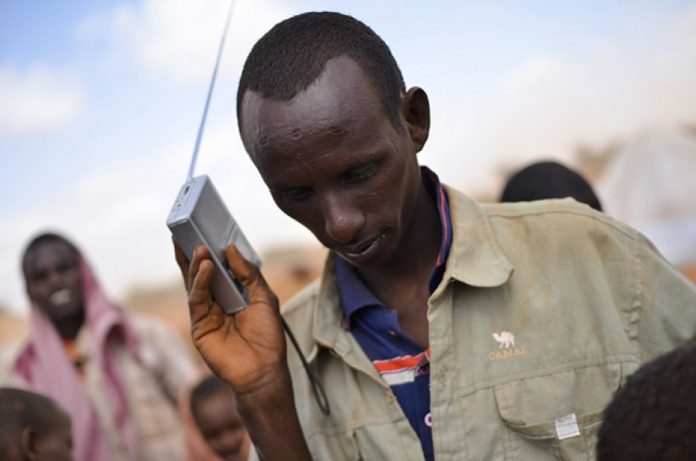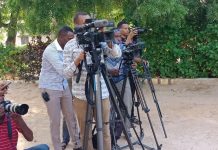One of my most vivid childhood memories growing up in Mogadishu is gathering around our old transistor radio on Friday mornings listening to Maaweelada Caruurta, a children’s show on Radio Mogadishu, performed by professional actors. The fables were often fantastical retelling of famous Somali folklore about cunning foxes, talking hyenas and scary witches.
I was always captivated by these tales. It tapped into a deep and universal need to hear stories. There was a unique intimacy in the act: one human voice telling a story to another human being in a way that transcended time and space. It was simple. It was intimate. It was beautiful. But in retrospect, I think I was more drawn to the “gather around the campfire” tradition that listening to the radio evoked.
In the evenings while we had dinner, we would listen to the nightly news with reports from far and away places where dramatic events that were beyond my comprehension were taking place. Stories such as British naval attacks in the Falkland Islands; the shootings of Palestinian stone throwers during the first Intifada; or the bravery of rioters in Soweto and other townships in Apartheid South Africa intrigued me. I believe my desire for travel, my curiosity about the world and my love of radio journalism was cultivated by those nightly newscasts on Radio Mogadishu. Radio became a gateway to a vast, chaotic, endlessly fascinating world and I yearned to know more about.
Even though we had a record player complete with the latest albums from America at home, not to mention a TV set with a VCR player, it was our old transistor radio that consistently held my interest throughout my childhood. It was no surprise then that many years later I ended up becoming a radio journalist with the Canadian Broadcasting Corporation. And even though my listening habits evolved over the decades—nowadays I download podcasts of my favorite shows from BBC, CBC and NPR and listen to them at my leisure—radio remains my favorite mode of mass communication.
And, as I have found out, I am not the only Somali still in love with radio. Perhaps due to the fact that we have a strong oral culture and have a staggeringly high illiteracy rate of about 55 percent, radio remains the most popular medium through which Somalis get their news, information and entertainment.
According to estimates, there are over 50 private radio stations currently operating in the country. Since the fall of Siad Barre’s regime and the subsequent civil war that devastated Somalia, there has been a proliferation of privately owned radio stations. Long gone are the days when there was only one national radio station whose reports were routinely censored by the regime. What has replaced government monopoly on news and information is a crowded, fragmented media landscape. The downside to the opening of the media space has been lax journalistic ethics and editorial standards in an environment where media regulation has not been priority.
But that is not to say that there is complete lack of professionalism in the radio industry. There are now an increasing number of well managed radio stations whose journalistic ethics and editorial practices meet international broadcasting standards.
Despite existing challenges, radio broadcasting in Somalia is growing in popularity day by day. Other than offering entertainment, it is the most influential mode of communication to the masses for the Federal Government and its partners.
Radio still has a special place in the hearts of many Somalis, young and old alike. For me, Radio Mogadishu is that station. And I am not alone. Some of Somalia’s most renowned journalists, singers and comedians owe their careers to Radio Mogadishu, which has been on air for over half a century. Even during the dark days in the capital when the terrorist group Al-Shabaab reigned terror on city residents and controlled much of the city, the brave journalists and technicians at Radio Mogadishu continued broadcasting from a walled compound guarded by African Union peacekeepers.
Through all the great social and technological upheavals of the twentieth century, the humble radio not only survived but also somehow thrived. For awhile, the conventional wisdom was that television would bring about the demise of the radio. And the advent of the internet foretold dark days for radio lovers. Surprisingly, however, the reach, influence and quality of radio broadcasting around the world continue to reach new heights. Ironically, the internet which was supposed to kill radio has transformed how we tell and share stories on the radio. Thanks to the Internet, we can now hear live broadcasts from the other side of the world with just a click of a button.
As we celebrate World Radio Day, we must remember the role radio has and continues to play in the lives of millions of people in the most stressed and remote places of the world. In countries beset by wars, revolutions and dictatorships, radio continues to be their lifeline. For these people, radio is not merely a medium through which they get a few hours of news and information, it is a source of comfort and solace. It gives them the reassurance that they are not alone.
By Hassan Ghedi Santur













